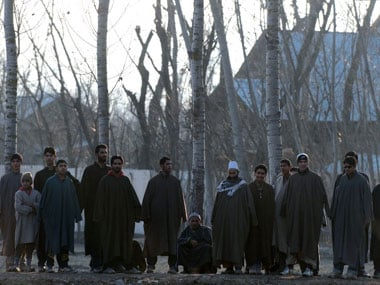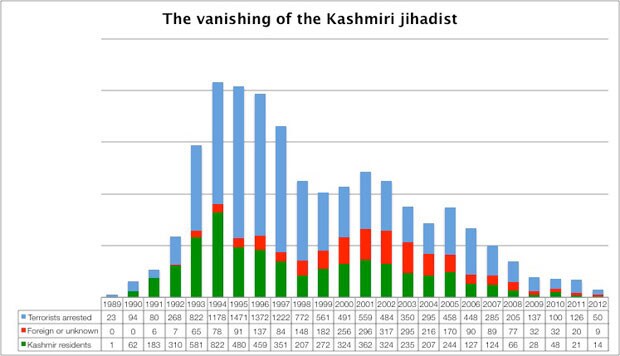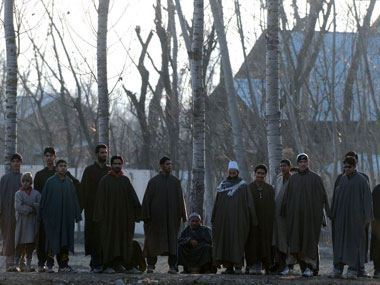“Let India’s dark empire listen to this”, Hilal Ahmad Mir thundered in a rage-filled speech delivered to a small audience in the Kashmir town of Palhalan in 2010,“We will say this until we die: it will be either martyrdom or s’haria." That year, violent street protests pitting protestors against police had broken out; over a hundred young people were killed. Mir ended up spending months in jail, before joining the Lashkar-e-Taiba. He met his end in May, shot dead by Indian troops. His words, to some, seem prophetic. Later this month, Zubin Mehta is scheduled to perform in Srinagar, an advertisement for the return of the normal world to the state. Monday’s attacks—an ambush, and the execution-style shooting of two policemen—give reason to fear the high-profile event might end up advertising something else. For the first time since 2002, killings have increased; infiltration is up; the Line of Control is on fire. Kashmir’s Islamist patriarch Syed Ali Shah Geelani has protested against the concert, saying India will use the music to drown out “sufferings of inmates of this beautiful jail”. Even as Zubin Mehta performs on the banks of the Dal Lake, is the new moon of the Kashmir jihad rising? [caption id=“attachment_1065679” align=“alignleft” width=“380”]  Kashmiri villagers watch as a gun battle takes place between militants and the Army. AFP.[/caption] For many weeks now, commentators have been saying just that: that a new generation of educated Kashmiris is emerging, radicalised by the anti-India street violence of 2010. Frontline magazine, Tehelka and The Hindustan Times have all carried reports pointing to a rise in numbers of educated young people joining jihadist groups — and even chief minister Omar Abdullah seems to agree.“The resurgence of militancy”, Shujaat Bukhari writes,“cannot be brushed aside”. He warns that “Kashmiri youth will repose their faith in violence”. It’s a terrifying prospect — or, rather, would be, if the facts it is built on had a passing resemblance to reality. There’s no shortage of anecdotes to back up the claim that there’s a rising tide of educated young Kashmiris queuing up to join jihadist groups like the Lashkar-e-Taiba or Jaish-e-Muhammad. Kulgam’s Umar Ahsan Bhat gave his life to the Lashkar while pursuing a masters degree in zoology. Ghulam Nabi Dar was pursuing a masters in computer applications from Kashmir University; Muzammil Dar, a qualified pharmacist; Ibrahim Janwari, an arts graduate. Each story, though, is a data-point — not a trend. Trends, though, there isn’t much evidence of. Eight ethnic-Kashmiri jihadists have been killed so far this year, but just one had a graduate qualification while another was a college dropout. Just seven of the ethnic Kashmiri jihadists killed over the last three years had finished college. Police list 36 local residents as active terror suspects, but just three — Shopian resident Muhammad Haq Malla, and Awantipora’s Shabbir Ahmad Mir and Reyaz Ahmad Naikoo — have graduate qualifications. Evidence in several cases discussed in the media is, moreover, ambiguous. Litter resident Sajjad Yousuf Mir, killed on June 1, had a master of arts degree — but joined the jihad in 2008, well before the street violence that’s purported to have spurred large-scale radicalisation. Saifullah Ahanger, killed in a May 25 firefight that claimed the lives of four soldiers, was reported to have been an engineering graduate. He had, however, dropped out of his engineering course — and, more to the point, came from a family with a long tradition of involvement in jihadist activity. Plenty of jihadists from all phases of Kashmir’s history — among them, Wasim Khatib, the son of an élite family, who was studying for a pilot’s licence in the United States, Bilal Beigh, Ishfaq Majid Wani, Ghulam Ahmad Naikoo — were well educated. “Frankly”, says Kashmir inspector-general of police Abdul Gani Mir, “There’s no evidence of a rise in recruitment, and none growing numbers of educated people are joining terror groups either." Mir has data on his side. The numbers don’t simply bear out claims of a significant drift of ethnic Kashmiris into jihadist groups, either. From a high 324 of ethnic-Kashmiri terrorists reported killed in 2001, the number has since declined to the low double-digits — and shows no sign of an upswing. The threat comes from men being despatched across the Line of Control, not a cause at home.  In 2010, when Hilal Mir began to be seduced by the idea of jihad, this outcome seemed improbable.Kashmir’s New Islamists, a coalition of figures on the religious right who had long worked to build a new foundation for the jihad that had been choked off by Pakistan’s beleaguered generals in 2001, thought their moment had come. The street protests that tore the state apart, they believed, were crucibles which a new generation of fighters were being forged. 2010, though, turned out to be a bloody sunset, not a new dawn. The making of Kashmir’s New Islamist movement dates back to 1992, when their then-imprisoned patriarch, Geelani, wrote the Rudad-i-Qafas, his prison diaries. Geelani warned Kashmir’s then-ascendant jihadists they were headed nowhere. “They have,” he argued, “Apparently miscalculated the enormity of the demands of the struggle and the strength of the power they are fighting against, fondly imagining that their goal would be achieved in no time." The armed movement, he argued, didn’t have political direction — and would pay the price. He was proved right. Pakistan’s Inter-Services Intelligencehadbacked the Hizb-ul-Mujahideen—led, in the main, by men from Geelani’s Jama’at-e-Islami Geelani helped build. In 1997, though, then Jama’at chief GM Bhat saw defeat ahead, and called for an end to Kashmir’s “gun culture”. Three years later, his ally, the dissident Hizb-ul-Mujahideen commander Abdul Majid Dar declared a unilateral ceasefire. In January 2004, the Jamaat’s Majlis-e-Shoora, or central consultative council, went public with a commitment to a “constitutional struggle”. Ejected from the Jama’at, Geelani set about building a new political movement, fighting struggles against alcohol, migrants, films, sex — all evidence, in his view, of an Indian anti-Islam plot. In Geelani’s view, the scholar Yoginder Sikand has perceptively argued, Kashmir was just a site for an irreducible civilizational struggle: “For Muslims to stay among Hindus or in an environment which is very different from their own is said to be as difficult as it is ‘for a fish to stay alive in a desert’”. New Islamist influence grew through the 2008 protests against the grant of land-use rights to the Amarnath shrine, which Geelani argued was the spearhead of a Hindu settler-colonial project. In an interview to the journalist Aasha Khosa, he said the time had come to struggle for a Kashmir where “secularism should not touch our lives and we must be totally governed by the Koran”. The 2010 protests ended with disillusion, though: more than a hundred young people dead, businesses bankrupted, no cause achieved—and leaders like Geelani discredited. In 1990, the journalist SanjoyHazarika recorded the sunrise of Kashmir’s jihad. He wrote of how Islamists had “ demonstrated their influence by closing cinemas, beauty parlors, bars and video movie halls, describing them as un-Islamic”. He recorded a conversation with a young university graduate angry with what she saw as “Hindu domination”: “Their television programs are full of Hindu scriptures. Their police shoot our boys. Where is the democracy?” Geelani is still having that conversation. Young Kashmiris mostly don’t. There might be a few young men headed towards the Lashkar, but tens of thousands more are headed into the civil services and the private sector. There’s a growing tide of religious recruits to religious neo-fundamentalist causes like the Tablighi Jama’at, as well as a welter of pietist religious movements—but just as many to the aestheticised Kashmiri nationalism so fashionable among the metropolitan Left, and perhaps even more tothe culture of market capitalism. Forced to shut down their war in Kashmir after 9/11, Pakistan’s besieged generals are hoping to resume their interrupted jihad once again. They’ll likely discover they have to resuscitate a corpse, not a cause.
As Zubin Mehta prepares to serenade Srinagar, some are warning a new generation of highly-educated jihadist is preparing towage war against India. The truth is different: Kashmir’s Islamist movement has never been weaker.
Advertisement
End of Article


)

)
)
)
)
)
)
)
)



